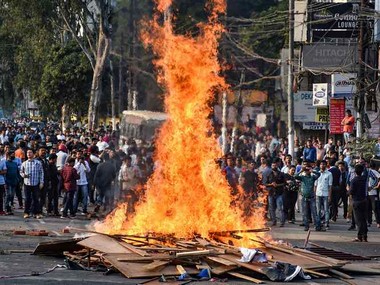Even though the Citizenship Amendment Bill is termed as anti-minority by its detractors, North East India, especially Assam, has shown a completely different face of it in its protests against the contentious Bill. Despite the popular perception that the Bill is Hindu-friendly and animus to the Muslims, it’s the Hindu-dominated areas in Assam that have witnessed violent protests against the Bill while protests in minority-dominated areas have remained largely peaceful. On Tuesday, the seven states in the region saw an 11-hour-long bandh call by the North East Students Organisation (NESO) during which violent protests erupted in the Hindu-dominated areas of Brahmaputra Valley in Assam. [caption id=“attachment_7770671” align=“alignnone” width=“825”] Protests over Citizenship bill continued in Assam on Wednesday as well. PTI[/caption] The bandh supporters wreaked havoc on the streets across Brahmaputra Valley amidst a bandh call. Several incidents of attacks on vehicles and stone-pelting and scuffles with the security forces were witnessed across the Valley. Apart from attacks on vehicles, incidents of protesters gheraoing BJP leaders and attacking their homes also took place during the bandh. Most such incidents, again, happened in the Hindu-dominated areas in Assam. The 11-hour bandh began at 5 am on Tuesday but protests against the Bill continued even after the bandh was over at 4 pm in the Brahmaputra Valley. People came out of their homes in thousands to participate in processions protesting against the bill raising slogans. In Tripura, the administration was forced to suspend SMS and data services for 48 hours following rumours of clashes between two groups of people. Nearly 84 percent of the population in Tripura is Hindu and Muslims comprise a meagre 9 percent of it. Significantly, the pattern of the protests shows that the argument that the Bill is anti-minority has hardly found any takers in the North East. The reason behind the antagonism of the northeastern states is attributed to the nature of the debate around citizenship. “In North East India, the debate around citizenship and indigenity was never based on religion. The debate has always been about the ethnicity of the people living in the region through centuries. Even the Hindus in the region do not distinguish between a Hindu illegal immigrant and a Muslim one. For them, the aggression of both Hindu and Muslim immigrants is a threat to their identity,” said Upamanyu Hazarika, a senior lawyer in the Supreme Court of India who has been championing the cause of Assamese indigenity. He also added that even the Hindus in North East India consider their form of Hinduism to be unique and want to protect it from external aggression which they think would be endangered by mass-scale immigration. The Assamese Hindus draw their religious inspiration from 16th-Century Vaishnavite saint Srimanta Sankardeva, who is also revered as a cultural icon for his contribution in shaping Assamese culture with literature, drama, dance and music. However, contrary to what’s been fuelling the protests in the North East, the debate around Citizenship (Amendment) Bill in the national platforms is mostly weaved around the principles of secularism espoused by the Constitution of India. The Citizenship (Amendment) Bill proposes to grant citizenship to Hindus, Christians, Sikhs, Parsis, Jains and Buddhists who fled to India facing religious persecution in Afghanistan, Bangladesh and Pakistan, but it does not include Muslim minorities from these countries such as Ahmadiyas and Shiyas on the same ground. The Congress party is opposing the Bill because it grants citizenship on the basis of religion. The party’s reason for opposing the “anti-minority” Bill is very different from that of the northeasterners. The Congress party’s stand on the Bill has hardly any resonance in the region. “I will oppose the CAB even if it allows citizenship to people from all religions because it can cause a grave threat to the culture practised in Assam,” says Shaheen Ahmed, a doctoral student, who is an ethnic Assamese Muslim and vocal supporter of NRC that attempts to identify illegal immigrants. The BJP has aptly pointed out the mismatch between the stands of the Congress party and that of the northeastern civil society groups to alienate the party from the population in the region. “Look at what Congress party’s stand on the CAB is. They will have no problem with it if a certain community is accommodated in it,” said Himanta Biswa Sarma on Monday while addressing a group of party workers. The protests mainly took place in the districts namely Jorhat, Sivasagar, Dibrugarh and Guwahati, which are mostly Hindu-dominated. Though protests took place in Muslim-dominated areas well, they were largely peaceful. “We have extended complete support to the organisations which have called the bandh. They have asked us to support the movement and we have issued press statement doing the same,” said Hafizul Ahmed, a leader among Assamese Muslims. Seven states in the region observed the bandh in protest against the Bill. The Hindu-dominated Imphal valley in Manipur did not see any violent protest as the state has been promised by Union Home Minister Amit Shah in his speech in the Lok Sabha that it will be provided protection under Inner Line Permit (ILP) regulation. This promise was fulfilled on Wednesday with the president signing an order extending ILP to the entire state of Manipur.
Protesters in Assam say they would oppose Citizenship (Amendment) Bill even if it included all religions, revealing a huge mismatch between the reasons behind the North East’s agitation against CAB and that of the Congress party
Advertisement
End of Article


)

)
)
)
)
)
)
)
)



